Vintage Treasures: The New Hugo Winners edited by Isaac Asimov
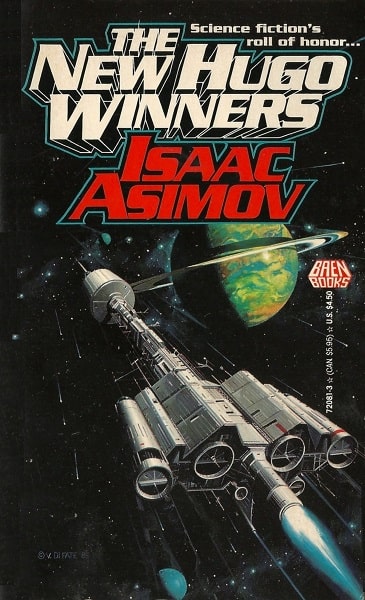 |
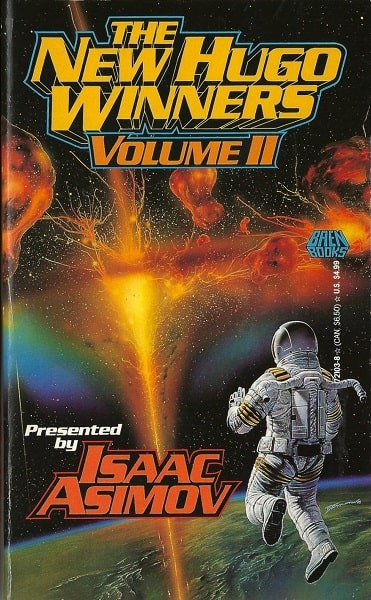 |
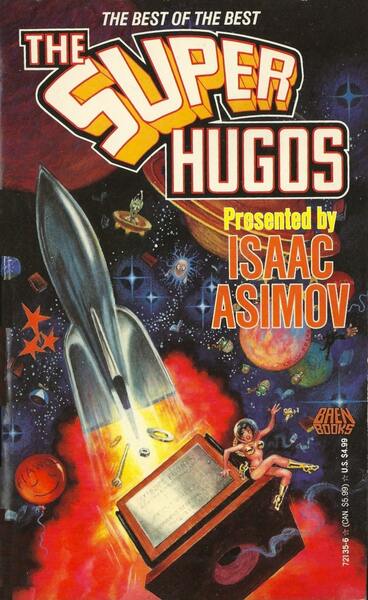 |
The New Hugo Winners, Volume I & II and The Super Hugos
(Baen, 1991, 1992, and 1992). Covers by Vincent Di Fate, Bob Eggleton, and Frank Kelly Freas
Last month, as part of my master plan to examine every interesting science fiction paperback ever printed, I surveyed five of the finest SF anthologies of all time: the first Hugo Winners volumes, all edited by Isaac Asimov and published by Doubleday between 1962 and 1986.
Although the first two volumes, collected in one big omnibus by the Science Fiction Book Club in 1972, were on the bookshelf of every serious SF fan in the 70 and 80s (and much of the 90s), by the time Volume IV and V were released in the mid-80s, sales had fallen off so significantly that neither one was reprinted in paperback. Asimov, who frequently noted that “the fine folks at Doubleday have never said no to me” — even indulging him with a massive 1,005-page, highly uncommercial vanity project in 1974, Before the Golden Age, a bunch of pulp stories threaded together with Asimov’s reminiscences of growing up in Brooklyn — found Doubleday saying ‘No” to further Hugo volumes.
It was Martin H. Greenberg, Asimov’s frequent collaborator, who talked him into doing additional installments. Together they produced three more: The New Hugo Winners, Volume 1 (1989) & Volume II (1992) and The Super Hugos, released after Asimov’s death in April 1992.
[Click the images for Hugo-worthy versions.]
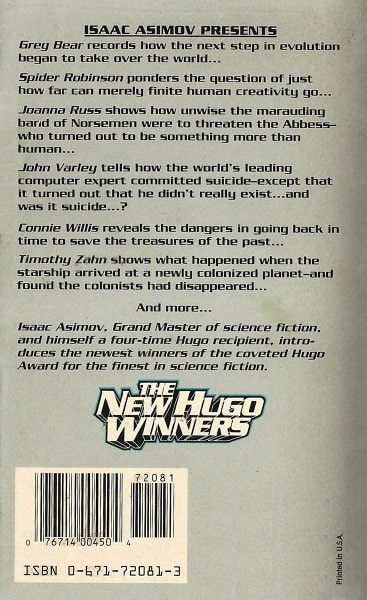 |
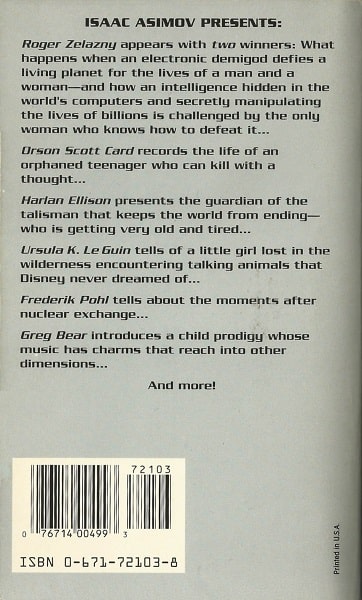 |
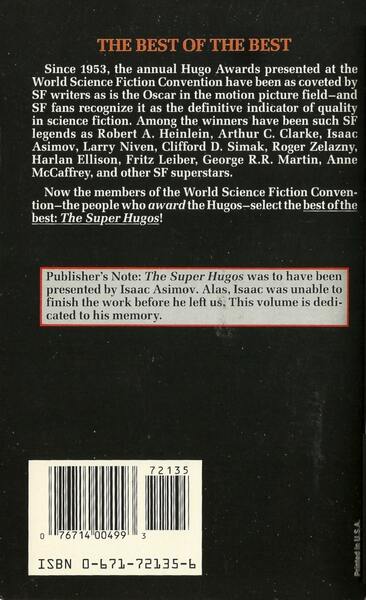 |
Back covers to The New Hugo Winners, Volume I & II and The Super Hugos
Here’s Asimov, from the introduction to The New Hugo Winners, Volume I.
Frankly, I had had enough, and I rather made up my mind that I wouldn’t do any more. I had aged a year or two in the quarter century since I had begun. I no longer knew, with any great intimacy, the flood of dazzling new writers who had entered the field and were garnering awards — not the way I knew the few old-timers who had shared the field with me when the world and we were young.
However, Martin H. Greenberg told me severely that I could not do that. The Hugo Winners volumes, he said, were important items to the lore and history of the field and transcended my personal desires for ease and comfort, so I would have to continue… I looked him right in the eye and said, “All right, Marty. I’ll do it… But you’ll have to do it with me.”
I insisted, and here we are, together again — and we have a fair division of labor. I write the introduction. I write the headnotes. He does the work. It couldn’t be better.
Besides, he is twenty-one years younger than I am. If things go as they ought to go, he will be able to carry on these volumes after I have departed to the great word processor in the sky (it used to be a typewriter, as I recall). And he can train others, who can train others, so that for as long as Earth and the human species lasts, volumes of Hugo Winners will come out periodically.
Greenberg did not carry on the series, as a matter of fact. When Asimov died he passed the baton to Connie Willis and Gregory Benford, who produced the next two Hugo anthologies, before Baen discontinued them in the late 90s.
The New Hugo Winners, Volume I was published in hardcover by Wynwood Press in December, 1989, and reprinted in paperback with a new cover by Baen in 1991. Below you can have a look at the hardcover edition, with cover flaps.
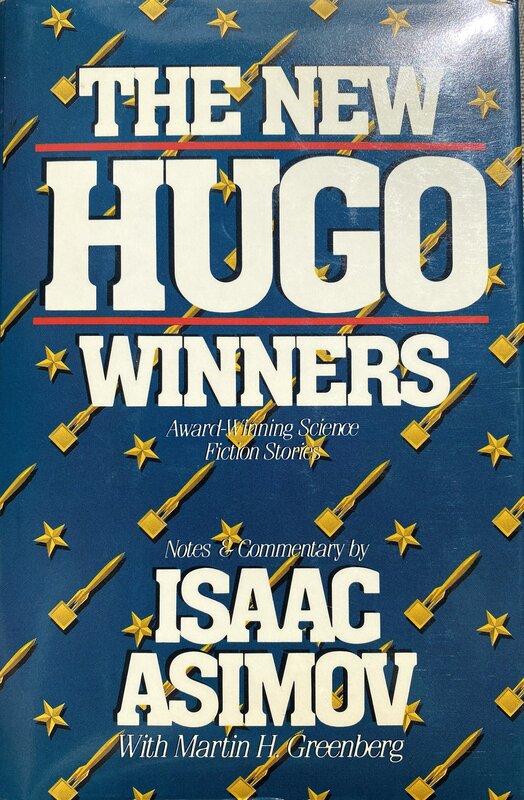 |
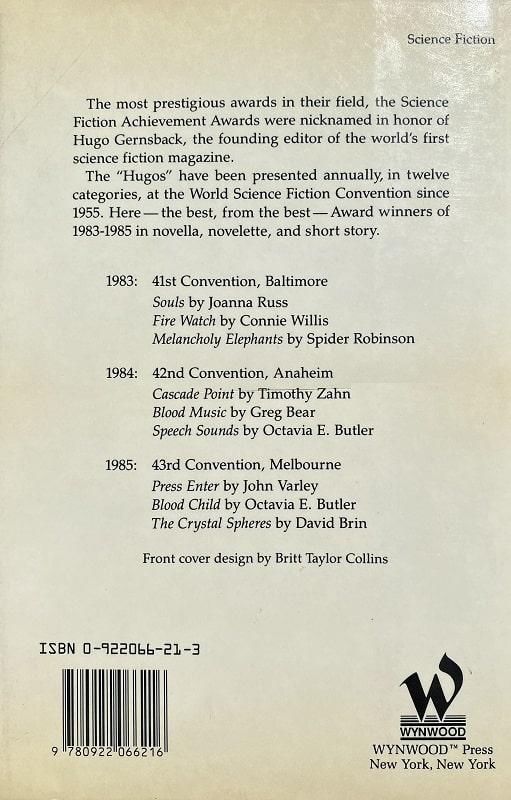 |
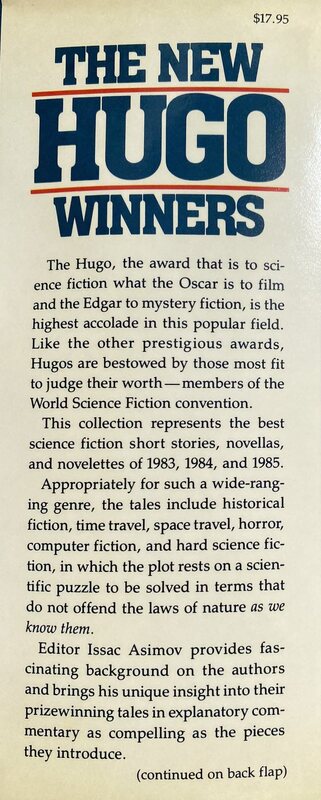 |
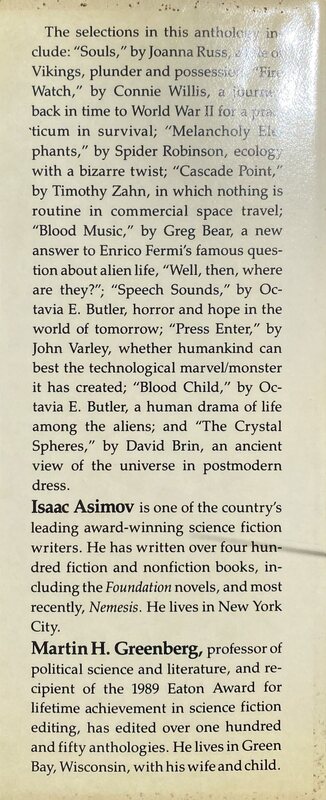 |
The New Hugo Winners (Wynwood Press hardcover edition, December 1989). Cover by Britt Taylor Collins
As usual with the later Hugo volumes, there was grousing over what stories were overlooked in the voting — including David Brin’s classic novella “The Postman,” Bruce Sterling’s first Shaper/Mechanist tale “Swarm,” Greg Bear’s famous novella of alien warfare, “Hardfought,” William F. Wu’s “Wong’s Lost and Found Emporium,” Lucius Shepard’s “The Man Who Painted the Dragon Griaule,” and George Alec Effinger’s gonzo tale “The Aliens Who Knew, I Mean, Everything.”
But overall this book is a very fine representation of the best short SF of the mid-80s, including Greg Bear’s chilling SF horror tale “Blood Music,” John Varley’s groundbreaking “Press Enter ▮,” and Octavia E. Butler’s brilliant “Bloodchild.” Here’s the complete table of contents.
The New Hugo Winners, Volume One
Introduction by Isaac Asimov
“Souls” by Joanna Russ (The Magazine of Fantasy & Science Fiction, January 1982)
“Fire Watch” by Connie Willis (Isaac Asimov’s Science Fiction Magazine, February 15, 1982)
“Melancholy Elephants” by Spider Robinson (Analog Science Fiction/Science Fact, June 1982)
“Cascade Point” by Timothy Zahn (Analog Science Fiction/Science Fact, December 1983)
“Blood Music” by Greg Bear (Analog Science Fiction/Science Fact, June 1983)
“Speech Sounds” by Octavia E. Butler (Isaac Asimov’s Science Fiction Magazine, Mid-December 1983)
“Press Enter ▮” by John Varley (Isaac Asimov’s Science Fiction Magazine, May 1984)
“Bloodchild” by Octavia E. Butler (Isaac Asimov’s Science Fiction Magazine, June 1984)
“The Crystal Spheres” by David Brin (Analog Science Fiction/Science Fact, January 1984)
Wynwood Press published only the one volume. Asimov and Greenberg brought the series to Baen three years later for The New Hugo Winners, Volume II, and Baen remained the publisher for the next decade.
The New Hugo Winners, Volume II (SFBC hardcover edition, 1992). Cover by Bob Eggleton
The series found new life as paperback originals at Baen. The New Hugo Winners, Volume II contained some truly excellent fiction, including one of my favorite stories of the 20th Century, “Why I Left Harry’s All-Night Hamburgers,” by Lawrence Watt-Evans, as well as several modern classics, including Roger Zelazny’s “24 Views of Mt. Fuji, by Hokusai,” Robert Silverberg’s “Gilgamesh in the Outback,” and Ursula K. Le Guin’s “Buffalo Gals, Won’t You Come Out Tonight.”
It also included an excerpt of Jerry Pournelle and S. M. Stirling’s novel The Children’s Hour, as a little Baen cross-promotion.
Here’s the complete Table of Contents.
The New Hugo Winners, Volume Two
Introduction by Isaac Asimov
“24 Views of Mt. Fuji, by Hokusai” by Roger Zelazny (Isaac Asimov’s Science Fiction Magazine, July 1985)
“Paladin of the Lost Hour” by Harlan Ellison (Universe 15, 1985)
“Fermi and Frost” by Frederik Pohl (Isaac Asimov’s Science Fiction Magazine, January 1985)
“Gilgamesh in the Outback” by Robert Silverberg (Isaac Asimov’s Science Fiction Magazine, July 1986)
“Permafrost” by Roger Zelazny (Omni, April 1986)
“Tangents” by Greg Bear (Omni, January 1986)
“Eye for Eye” by Orson Scott Card (Isaac Asimov’s Science Fiction Magazine, March 1987)
“Buffalo Gals, Won’t You Come Out Tonight” by Ursula K. Le Guin (The Magazine of Fantasy & Science Fiction, November 1987)
“Why I Left Harry’s All-Night Hamburgers” by Lawrence Watt-Evans (Isaac Asimov’s Science Fiction Magazine, July 1987)
Appendix: The Hugo Awards
The Children’s Hour (excerpt) by Jerry Pournelle and S. M. Stirling
Here’s a look at the inside cover flaps for the hardcover edition of Volume II.
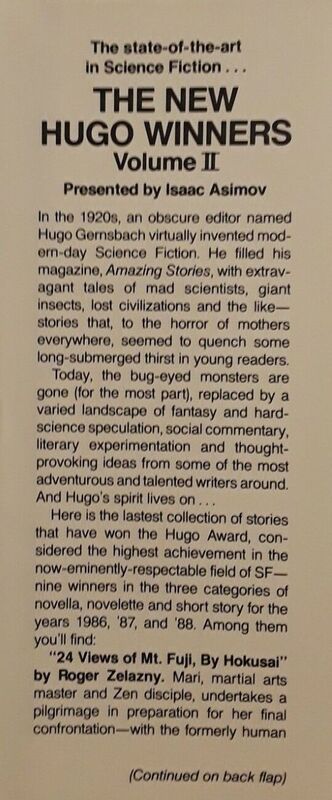 |
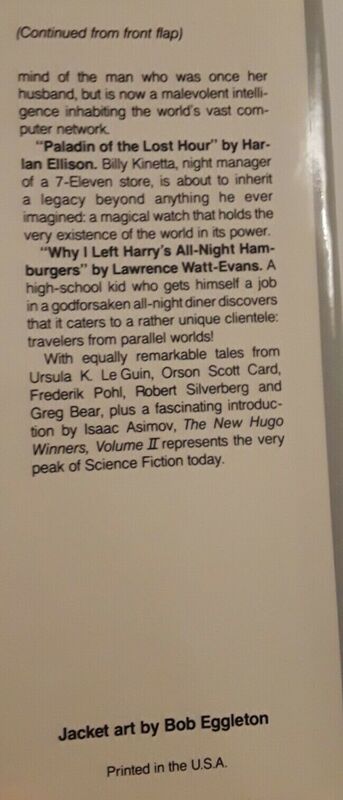 |
Cover flaps for The New Hugo Winners, Volume II (SFBC hardcover edition, 1992)
Asimov died of AIDS in April 1992, while he was preparing The Super Hugos with Marty Greenberg. It was published posthumously in September of that year,
Lots of folks questioned the rationale of a “Super Hugos” collection, which implied that some Hugos were greater than others. That’s the kind of thing we probably should be questioning.
But strictly from a promotional point it view, it made sense. The first five volumes of The Hugo Winners were long out of print by the early 90s, including the early bestsellers. A mass market paperback introducing new readers to the glory of the early Hugo winners was a great idea, and it certainly couldn’t hurt future sales. So maybe we squint a little bit at this book, but we understand why a publisher might be tempted.
Besides, it’s an absolutely stomping collection. Greenberg completed the book, and asked Charles Sheffield to write the introduction and story notes. While the selections were widely debated (as you’d expect), I think the editors made the right choices (mostly). Yes, there’s no excuse for not including “The Ones Who Walk Away from Omelas” by Ursula K. Le Guin, for example. But any Best-of-the-Hugos collection that includes George R.R. Martin’s “Sandkings,” “The Big Front Yard” by Clifford D. Simak, Harlan Ellison’s “Repent, Harlequin!” Said the Ticktockman,” and (of course!) “Flowers for Algernon” by Daniel Keyes is doing something right in my book.
The Super Hugos was “presented” by Isaac Asimov and edited by Martin H. Greenberg. Here’s the complete TOC.
The Super Hugos
Introduction by Charles Sheffield
“Sandkings” by George R. R. Martin (Omni, August 1979)
“The Bicentennial Man” by Isaac Asimov (Stellar #2, 1976)
“Enemy Mine” by Barry B. Longyear (Isaac Asimov’s Science Fiction Magazine, September 1979)
“The Star” by Arthur C. Clarke (Infinity Science Fiction, November 1955)
“The Big Front Yard” by Clifford D. Simak (Astounding Science Fiction, October 1958)
“Repent, Harlequin!” Said the Ticktockman” by Harlan Ellison (Galaxy Magazine, December 1965)
“Weyr Search” by Anne McCaffrey (Analog Science Fiction -> Science Fact, October 1967)
“Neutron Star” by Larry Niven (If, October 1966)
“I Have No Mouth, and I Must Scream” by Harlan Ellison (If, March 1967)
“Flowers for Algernon” by Daniel Keyes (The Magazine of Fantasy and Science Fiction, April 1959)
About the Super Hugo Voting, by Joe Siclari and Edie Stern
Appendix: The Hugo Awards
After Asimov’s death, Bean kept the series going for two more volumes: The New Hugo Winners, Volume III, edited by Connie Willis (1994), and The New Hugo Winners, Volume IV, edited by Gregory Benford (1997). We’ll cover those in the next installment.
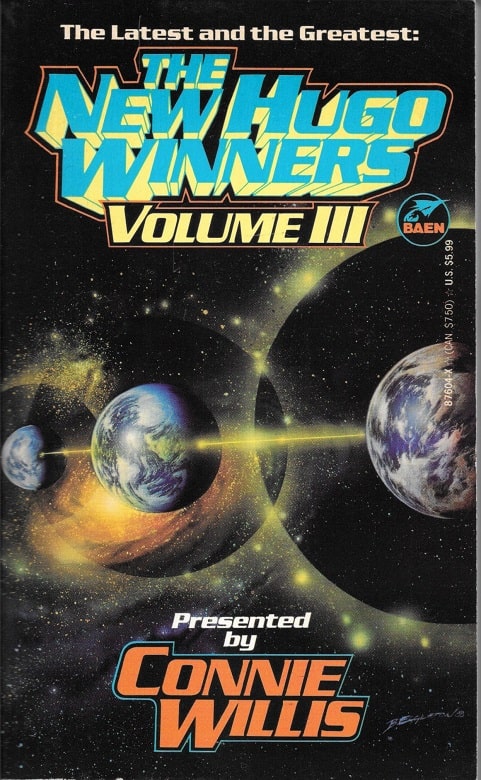 |
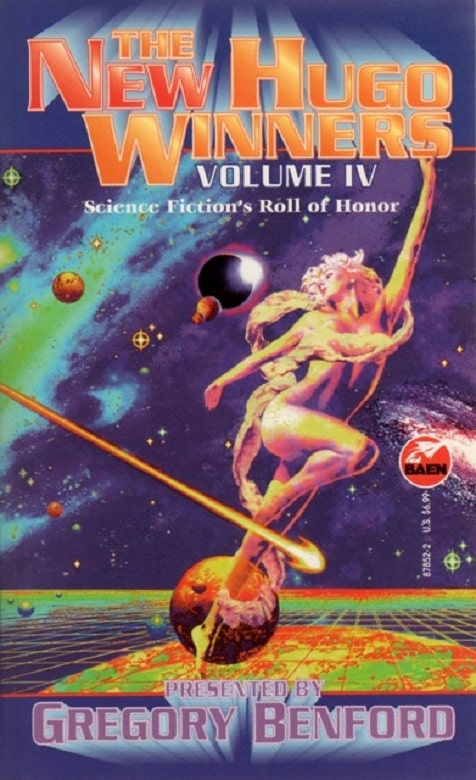 |
The New Hugo Winners, Volumes III and IV (Baen, 1994 and 1997). Covers by Bob Eggleton
There has been no new Hugo Winners anthology in the last 25 years, and one is long overdue.
Here’s the complete details on all four volumes of The New Hugo Winners, plus The Super Hugos.
The New Hugo Winners, edited by Isaac Asimov and Martin H. Greenberg (320 pages, $4.50 in paperback, September 1991) — cover by Vincent Di Fate
The New Hugo Winners, Volume II, edited by Isaac Asimov and Martin H. Greenberg (375 pages, $4.99 in paperback, January 1992) — cover by Bob Eggleton
The New Hugo Winners, Volume III, edited by Connie Willis (456 pages, $5.99 in paperback, May 1994) — cover by Bob Eggleton
The New Hugo Winners, Volume IV, edited by Gregory Benford (537 pages, $6.99 in paperback, November 1997) — cover by Bob Eggleton
The Super Hugos, presented by Isaac Asimov and edited by Martin H. Greenberg (424 pages, $4.99 in paperback, September 1992) — cover by Frank Kelly Freas
All five books published in paperback by Baen, the last four as paperback originals. The first three were reprinted in hardcover by the SFBC, the last two have never had a hardcover edition. There are no digital editions.
Here’s our previous coverage of Asimov’s Hugo Winners.
The Hugo Winners (Doubleday, 318 pages, $4.50 in hardcover, 1962) — cover uncredited
The Hugo Winners, Volume Two (Doubleday, 667 pages, $9.95 in hardcover, September 1971) — cover by Alan Peckolick
The Hugo Winners, Volumes One and Two (SFBC, 849 pages, $3.98 in hardcover, January 1972) — cover by F. & J. Silversmiths, Inc.
The Hugo Winners, Volume Three (Doubleday, 622 pages, $12.50 in hardcover, August 1977) — cover by Robert Jay Silverman
The Hugo Winners, Volume 4 (Doubleday, 575 pages, $19.95 in hardcover, April 1985) — cover by Kiyoshi Kanai
The Hugo Winners, Volume 5 (Doubleday, 384 pages, $18.95 in hardcover, April 1986) — cover by Tita Nasol
See all of our recent Vintage Treasures here.
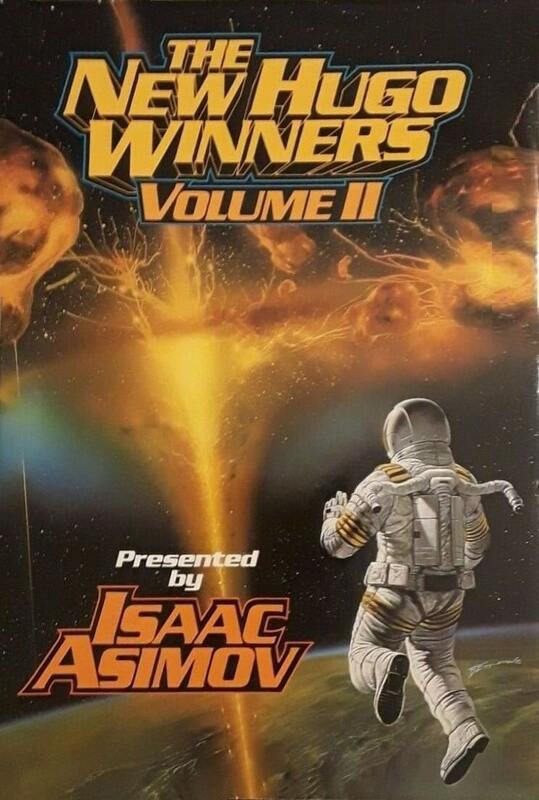
Good collections. I know most of the stories. The exception would be ones by Timothy Zahn, Jerry Pournelle and Spider Robinson. Could have done without the Bicentennial Man by Asimov. The only story here that I don’t like.
I’m fond of “The Bicentennial Man,” though I admit a lot of my admiration for that story is tied up with my nostalgia for the I, ROBOT tales. I thought it made a very fitting capstone for that series.
I haven’t read THE NEW HUGO WINNERS cover to cover the way I read most of the earlier volumes, partially because I was reading the stories as they appeared in magazines at the time. But, like you, I have a few gaps! I should probably add these to my TBR pile.
i can’t imagine the amount of sci fi fans that were made just by using issax asimoc’s name on all the anthologies. i still love a good anthology and with Gardner Dozois passing, i dunno who’s go to name i should look for, maybe John Joseph Adams?
Cory,
I know what you mean. JJA is an excellent anthologist, well worth following. I also enjoy Rich Horton’s books, and Paula Guran. There are still plenty of anthologists worth following!
Not sci-fi, but for horror anthologies, Ellen Datlow doesn’t put her name on something that is not excellent. Datlow is the gold standard in horror anthologies today.
There was one further attempt at a Hugo anthology after the Baen books: The Hugo Award Showcase: 2010 Volume, edited by Mary Robinette Kowal. The book was, frankly, a disappointment because it didn’t even include the short story winner, Ted Chiang’s “Exhalation”. It continues to baffle me how the Hugo Awards can be considered the pinnacle of the field, and yet nobody wants an anthology of the winners.
Piet,
I forgot all about that book! It was published by Sean Wallace’s Prime Books, in imitation of the popular Nebula Awards Showcase, focusing on one year (in this case 2008), and including both the winners and a selection of the nominees.
The Hugo winners that year were “The Erdmann Nexus” by Nancy Kress (novella), “Shoggoths In Bloom,” by Elizabeth Bear (novelette), and Ted Chiang’s “Exhalation” (short story, not included, doubtless for rights reasons.)
It seemed like a terrific idea, but it didn’t catch on, and Prime only did the one volume. Pity!
I don’t hold these volumes quite as high as I do the first three in the series. While there are fine stories in them (especially from Robinson, Varley, Zelazny and Watt-Evans), to me the linchpin in these volumes were Isaac Asimov’s introductions. In the first three volumes he had many personal reminiscences with the various authors. Even with a story I didn’t particularly care for (I’ve never been a big Harlan Ellison fan, for example), his stories about his interactions with the author was pure gold, and I could re-read those without reading the story.
The quote you have from Asimov is key: “I no longer knew, with any great intimacy, the flood of dazzling new writers who had entered the field and were garnering awards — not the way I knew the few old-timers who had shared the field with me when the world and we were young.” His not closely knowing the new authors, to me at least, shows in his introductions. While they are certainly competent, they lack that personal touch that’s present in the first three volumes. The informal, chatty style he had was what I always enjoyed, and it just wasn’t there anymore. While I have the two New Hugo Winner volumes (I never picked up the Super Hugos or the later volumes edited by Willis and Benford), I don’t revisit those as often as I do those first three volumes.
One last observation: it’s interesting how the source for the Hugo winners changed between the first and second New Hugo volumes. The first had mostly entries that were either from Analog or Asimov’s own SF magazine (with a lone entry from F&SF). The second volume has no stories from Analog, Asimov’s SF magazine is the dominant source, plus two each from F&SF and Omni, and one from Universe 15. The field for short fiction was slowly changing.
Does anyone know from where I can obtain volume I??